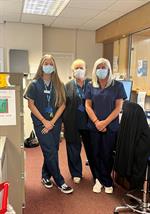The role of GP receptionist has changed in recent years, they play a key part in helping patients get the right care, by the right healthcare professional at the right time.
Now known as care navigators or care coordinators, receptionists have a much wider role than just answering phones and making appointments.
There are currently unprecedented pressures across health services in Sheffield. This is in common with most areas of the country and is leading to huge levels of demand for GP services.
Sometimes, seeing a GP isn’t the best option for the patient. In fact, studies show that 25-40% of consultations with a GP are unnecessary. Some patients may receive more appropriate care and advice more quickly elsewhere - for example, a physiotherapist for back pain, or a nurse for a skin rash - freeing up the GPs time for those who really need it.
This is where care navigators come in. Care navigators receive comprehensive training and their role is to actively listen, to signpost people to sources of help, advocacy and support, and to help people play an active role in managing their own health.
Thail who has been a Care Coordinator at Chapelgreen Practice for 4 years, explains: “There is a misunderstanding that receptionists are being nosey when we ask for information from a patient, or that we are trying to gatekeep appointments. This isn’t the case at all. By asking a number of questions from the patient we are able to make sure that we book them an appointment with the right healthcare professional, or if its more appropriate, signpost them to other services in the city. We will still book an appointment with a GP if the patient feels they need it but they may have to wait longer for this.
“I really enjoy my job and the vast majority of our patients are lovely and polite - we’ve even had some of them thank us with chocolates and flowers. We hope patients realise we’re there to help them.”
Dr Ben Allen, GP and Primary Care Clinical Director at NHS Sheffield CCG, said: “Care navigators are an integral part of the practice team, they work really hard to ensure patients get seen by the right healthcare professional. The information you give receptionist will ensure you get the right care, in the right way, by the right person.
“All staff operate to strict guidelines and work under clinical supervision. As a doctor I trust them and you can trust them to treat all information given confidentially.”
The way practices offer appointments changed during the pandemic. Many more telephone and video consultations have been offered. Many patients like not having to attend their surgery in person when the problem can be safely dealt with remotely. Not only do most patients like telephone and online appointments, but it also stops covid from spreading and staff can get through to more patients, including those with urgent health needs.
Dr Allen added: “The feedback we’ve had is that most patients like telephone and online appointments. It can save you time waiting for a face-to-face appointment or taking time off work to attend. Many illnesses can be treated by these remote consultations. For these reasons, we see fewer patients face-to-face. If you are assessed as needing a face-to-face appointment this will always be offered.”
This is the case at practices across the city. GP surgeries are working hard to cope with the additional demand which includes bringing in more staff in different professional roles, such as care navigators, to help. Extra funding and support are also being shared across South Yorkshire to make even more appointments available.
NHS Sheffield CCG has invested in more evening and weekend appointments at extended access hubs across the city and are investing more in technology to improve communication and efficiency.




 Translate this page
Translate this page